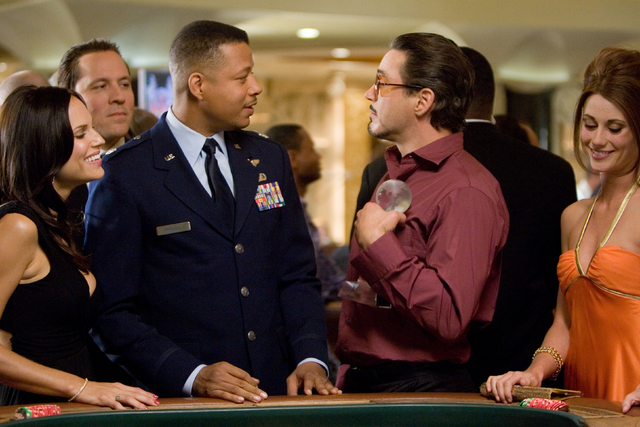Whether a bit player or the star, Caesars Palace has earned a place in cinematic history

Very twinkly. Very sparkly. And more than ready for its close-up from the very start.
But no, Caesar never lived at Caesars Palace. Not unless you count Dom DeLuise’s Emperor Nero from Mel Brooks’ 1981 “History of the World: Part I.” (Which we do, but we’ll get to him later.)
The Caesars Palace of today looks, and feels, far different from the one that brought a new cachet to the Las Vegas Strip when it opened its doors in 1966.
Thanks to the undeniable magic of the movies, however, we can relive the glory that was Rome — the Vegas version, anyway — in all its gaudy Technicolor over-the-topness.
You probably don’t remember the first major motion picture, as they described them in those days, to shoot at Caesars Palace. Don’t feel bad, nobody does. (Except the folks in the Caesars marketing department.)
But that major motion picture’s title, “Where It’s At,” symbolized the response to, and the role played by, Las Vegas’ first ultra-luxurious themed resort.
A generation-gap comedy (remember, this was 1969), “Where It’s At” starred TV “Fugitive” David Janssen as the casino boss and Robert Drivas as his college-student son. The credits helpfully noted: “Also starring Caesars Palace as Caesars Palace.”
Arriving in theaters in May 1969, “Where It’s At” had a four-month head start on the second filmed-at-Caesars movie: “Hell’s Angels ’69,” which didn’t even make the hotel’s list of on-property movie projects.
They may not remember this lurid bank-robbers-masquerading-as-bikers melodrama, but we do. “This was the RUMBLE that ROCKED Las Vegas!” the movie’s tagline proclaimed. (The characters’ outlaw duds prompt a snooty desk clerk to inform them that “Caesars Palace is used to informal dress, but this is really off-limits.”)
Caesars didn’t hit the Hollywood A-list jackpot until the following year, when Elizabeth Taylor and Warren Beatty played “The Only Game in Town.” She’s a lonely dancer waiting for her married lover to get a divorce; he’s a compulsive gambler and a frustrated musician, not necessarily in that order.
As the movie’s trailer trumpeted: “DICE IS HIS VICE! … MEN ARE HERS! Only Elizabeth Taylor, Only Warren Beatty Could Play … ‘The Only Game in Town. ’ ”
Because La Liz wanted to be close to then-husband Richard Burton, then filming in Europe, much of the movie shot in Paris — the real one. That is, until the studio discovered that, following 86 days in Paris, you just couldn’t fake Vegas, prompting 10 additional production days on the Strip.
Since then, Caesars has played host to more than two dozen movies.
Some (1990’s “Rocky V,” for example, or 2006’s “Dreamgirls”) spend little time at Caesars, zooming in for quick hits of Vegas vitality.
Others make Caesars a stop on their cross-country cinematic tours, as in 2012’s “The Guilt Trip,” which puts a West Coast-based inventor (Seth Rogen) and his New Jersey-based mother (Barbra Streisand), on the road to the Strip.
That cross-country description also applies to 1988’s best picture Oscar-winner, “Rain Man,” when hustler Charlie Babbitt (Tom Cruise) discovers the savant-level mathematical powers of his autistic brother, Raymond (Oscar-winner Dustin Hoffman), triggering an immediate beeline to Caesars Palace for some undetectable card-counting.
“You know there’s no one in the world who can count into a six-deck shoe,” perplexed eye-in-the-sky observers comment as the Babbitt bros make a killing at the blackjack table. No one but Raymond, that is.
But “Rain Man” also finds time to explore other angles of a transformative Vegas visit, from brotherly dance lessons in the privacy of their high-roller suite (the “twinkly, sparkly” panoramic view of 1988 highlighted by the now-demolished Sands tower across the Strip) to an elevator kiss shared by Raymond and Charlie’s girlfriend, Susanna (Valeria Golino).
A Caesars Palace elevator also provides a perfect backdrop for screwball flirtation in the Coen Brothers’ 2003 comedy “Intolerable Cruelty,” in which an ace divorce attorney (frequent Coen collaborator George Clooney) finds himself bewitched, bothered and bewildered by a multiply-married gold digger (Catherine Zeta-Jones). Not surprisingly, the two also share a romantic evening in the same Emperors Suite where “Rain Man” filmed.
Speaking of emperors (we promised we would), madcap Mel Brooks and Gregory Hines must fight (each other) for their lives in “History of the World: Part I” when wretched-excess Emperor Nero (DeLuise) objects to “stand-up philosopher” Comicus’ political jokes with a hearty “Kill him!” (When Hines’ character spills wine on Nero, the emperor reacts with an even heartier “Kill him, too!”)
From Brooks’ anything-for-a-laugh insanity, it’s a short trip to the wall-to-wall Wolf Pack outrageousness of 2009’s “The Hangover” and 2013’s “The Hangover Part III” deliver, from tigers to Tyson to Mr. Chow (Ken Jeong) warbling “I believe I can fly” after parachuting from his penthouse.
That embodies one aspect of the what-happens-at-Caesars aesthetic.
The other extreme occurs when filmmakers employ Caesars (and, by extension, Las Vegas) as a metaphor for America’s moral decay.
In 1979’s “The Electric Horseman,” a played-out rodeo champ turned light-bedecked corporate shill (Robert Redford), riding a world-famous racehorse, hightails it through the casino and onto the equally light-bedecked Strip, bound for a purer, more natural landscape, literally and figuratively.
By the time 2015’s “The Big Short” rolls around, the casino has changed. So has what’s at stake, as a former trader (played by producer Brad Pitt) explains it all to his giddy young cohorts: “You just bet against the American economy — which means if we’re right, if we’re right, people lose homes. People lose jobs. People lose retirement savings. People lose pensions.”
But hey, it’s Caesars, where the slot machines keep clanging, the roulette wheels keep spinning — and the movie cameras keep rolling, forever fascinated not only by the surface glitter and glamour but what lies beneath. Which isn’t always so twinkly and sparkly.
Read more from Carol Cling at reviewjournal.com. Contact her at ccling@reviewjournal.com and follow @CarolSCling on Twitter.